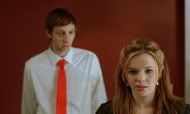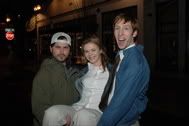
I’m awesome. I wrote a book. It’s got little to do with movies. Download and read “Thank You, Goodnight” right HERE for free.
 I saw SPIRAL months ago.
I saw SPIRAL months ago.
You never quite know how many movies are out there that languish in the black hole of distribution hell but SPIRAL just felt like a step above a lot of its contemporaries. I wanted to see this one to make it but the odds are never in the favor of a film that has its own voice, its own sense of independence from the norm. That, alone, could have killed its chances but this film has proven itself for what it is: a Hitchcock-ian suspense thriller that delivers on its ability to be a fresh take on a genre that has been replaced in the mainstream by overtly horrific titles like SAW or HOSTEL.
Starring Joel Moore and Zachary Levi this modern tale of a guy who can’t get it together in a world that he has trouble navigating in (Moore) and a boss who has an equal amount of dysfunction in his own life (Levi) SPIRAL looks at what happens when the past is too much to be left there and what can happen when steps are made to move forward beyond it.
The film itself is superbly written and acted in but the real thrust of the film’s beauty is its cinematography and attention to the minute details of these character’s lives. Too often the brush strokes of a script want to accentuate the more visceral, eye-popping details of a character’s existence but SPIRAL takes its time to develop these people’s lives to the point where you start believing their existence, making the ending that much more thrilling.
The movie was one of the best thrillers I saw in 2007 and it was a delight to see that it’s not only going to make its theatrical debut in selected cities on February 8th and on video just a week and a half later on February 19th. The combination of Moore’s directing/writing and of Jeremy Boreing’s writing with Levi and Amber Tamblyn’s performances should prove to be the reason why this movie stands above most of the other independent fare that passes as film. SPIRAL demands to be seen as one of the best mind scramblers you can treat yourself to this winter.
I caught up with Joel Moore and Jeremy Boreing to talk about the process of making this film, about having to share writing duties, of Joel’s directing responsibilities and what it was like to see their written work come to life on the screen .
 CHRISTOPHER STIPP: Hey, Joel, Jeremy.
CHRISTOPHER STIPP: Hey, Joel, Jeremy.
JOEL MOORE: Hey, how are you doing?
CS: Good, good. This must be your third day of press. I can’t imagine how that’s been.
MOORE: Actually like five but it’s all good.
We’re really proud of this movie and we want to get it out to as many places as we can so the people can know about it. It’s really a dream come true for me and a movie that I think people will really enjoy and characters from actors that have spent a lot of time in the comedy world.
CS: Well, I’ve seen the film and I really liked it. Genuinely thrilling.
MOORE: Thanks. I really appreciate it.
CS: After seeing the movie, the character of Mason, which you play, doesn’t seem like a guy who really endears himself to the audience. I think people were supposed to like him in a way but the character tries at every opportunity to make it very tough to sympathize with his personality.
MOORE: It’s an uncomfortable character – it’s awkward. The nice thing about it is we went back and forth in the writing, Adam Green and I, the co-director of the film, and wanted to make sure it was a character that could be endearing enough and innocent enough that you could follow. And I think we did a good job.
JEREMY BOREING: When we first sat down to write the movie, the question came up several times – how do you write a film where the antagonistic character – he is an antagonistic character and he is the one who is the bad guy in the end – but we tried to maintain his innocence, not innocent in crime, but in his approach and motivation? I remember several people asked us if there were any fights on set and the truth is there weren’t but the closest thing to it was repeated conversation between Adam Green and myself. It was over (without giving away any spoilers) it was over the climatic scene with Joel and Amber.
And Adam, who brought his experience of HATCHET and love of horror to the film in a really positive way, helped us to really exploit the suspense and the scary moments of the picture. But he wanted that scene to be a certain way. He felt like it would align with Mason if he lost the ability to look back on the journey with any compassion. And the way I wanted to do it was very soft and natural looking. Now, if the scene were you’ve seen it so you know, what he does in that scene is he’s apologizing the entire time and that was sort of the compromise out of that conversation.
It’s one of the really inspired moments of the movie and it was born out of compromise of all the creative parts and our desire to keep Mason as likeable as possible. And then, of course, the other way we tried to do it was making the Berkeley character so outlandish. In the end he’s not the bad guy but we let him be the heavy throughout the film so there is at least a character that seems worse on the surface then Mason so we can balance out Mason and make him more likeable throughout.
CS: Jeremy, I’d like to ask you and Joel, and please jump in by all means since you guys co-wrote it, the character Zach Levi plays seems to be a Lothario. He’s almost a mean-spirited guy but he finds something in Mason and he sees himself almost as a protector. He plays two sides because he’s mean to everybody else but seems to like Mason. Why did you create him to be that way?
 MOORE: We wanted to do something interesting with those two characters and have them mirror each other in a way.
MOORE: We wanted to do something interesting with those two characters and have them mirror each other in a way.
Obviously, they’re very lonely characters and also have had some sort of trauma in the past. We give the audience hints of that as the movie progresses. And I think what is interesting is the difference between them is the way they reacted to those traumas. While the character Berkeley reacted by covering it up and trying to be outgoing and chauvinistic and being outgoing and just keeping himself in the spotlight so he cannot think about what’s going on.
Mason, in turn, wears his emotions on his sleeve and obviously reacted to his trauma by retreating into himself, so very neurotic and out of touch and awkward. It’s one of those reasons we put him as a worker in a phone bank because we wanted to put him around tons of people so the audience could see how awkward he is and how he wants to be involved and wants to deal with half these friends but doesn’t know how to because he doesn’t know how to relate to people.
And the other thing about the relationship is that Berkeley needs Mason just as much as Mason needs Berkeley. Mason is Berkeley’s ticket to still feeling like he is a good person. So he can be a jerk to everybody else in his life and he can be a jerk to Mason as well but at least he deals with Mason, whereas other people don’t. The scene between Tricia Helfer who plays Berkeley’s friend and did it wonderfully; I think she is just a class act, she kinda calls him out in the scene and says “He’s like your pet” and I think that is an important scene in the way Berkeley reacts to it. He says, yeah, I’m the same asshole who is a jerk to him from behind his back and in front of him and I am that guy but at least I’m his friend.
BOREING: I think that all three of the main characters deal with loneliness on different levels and as much as Berkeley seems like a cool guy but is abusive to women in his own way too. He is dealing with whatever the upbringing that sort of is implied throughout the picture that maybe the two of them share a similar history. It manifested itself in different ways.
Berkeley’s inability to have meaningful relationships with any of these women throughout the movie I think is part of the reason. And the same with Amber. Why would a girl like Amber wind up with a guy like Mason? I think why these three characters invest in each other is because they are the only three people they have to invest in. And I think that is just born out of the lonliness they have. They are isolated souls in a way and it manifests itself in different ways as it filters through their personalities. One is a womanizer, one is a chatterbox, and one of them may or may not be troubled but they are all dealing with a fundamental issue.
 CS: Could you talk about the writing process itself, i.e. co-writing? Where did the process begin?
CS: Could you talk about the writing process itself, i.e. co-writing? Where did the process begin?
BOREING: Basically, I wrote the movie but the only way I could convince Joel to be in it was to give him credit.
MOORE: The movie started from a short film I had written and I brought it to Jeremy and he said “Let’s make a picture out of it.” So we took the idea from the short and did a lot of character development. It was an interesting process because we just locked ourselves in my living room and worked around a movie I was shooting at the time. We wanted to fill out the depth of these characters and took a lot from where we were in our life. A great friend of ours, Todd Caldwell is a jazz musician and has a bunch of jazz songs. So we thought it would be great to actually score this as a jazz score. We brought Todd together with Michael Fish Herring and the two of them scored a what I think is the best part of the movie: the score. It’s phenomenal. It’s a full jazz score and digital jazz – all live jazz. And you never see that. It’s analog. You don’t see anything except a classical score. So we knew we were taking a chance in scoring with jazz elements. We didn’t know what would fit where and how effective it was – it was a hard and difficult process.
CS: And certainly you co-directing, co-producing, writing, what was that process like having to navigate with so many hats on your head? Did it help the performance? Did you find that you were constantly trying to stay one step ahead – thinking about things as you were doing them?
MOORE: It was interesting. I knew that I wanted to work with Adam again on something but I didn’t know that as soon as he finished HATCHET, 5 months later, we agreed to do SPIRAL. And we had been talking the whole time about HATCHET and trying to find something we can work on so it was just a delight to grab this. Adam and I worked together very well.
Sometimes you don’t know how co-directing is going to go – two different people – but because we did so much work before, looked at shot lists and did everything that we could before we got on the set everything was figured out. And, of course, life and being on set shows you about having to deal with being thrown for loops. But we were prepared for the loops and Adam and I are very creative guys and met at a level of hustle and passion and creativity.
We didn’t not make our days very often. We rarely went into overtime. There were a handful of times we had to push over our normal 12 hours. But it went really well and a lot of that I have to give credit to Craig Borden, our first assistant director who also worked on HATCHET and our local crew in Portland, Oregon, my hometown. I set this in places that I lived in growing up. Mt. Tabor, where Mason played basketball – that’s where I played basketball growing up. Amber and Mason would go feed ducks – that’s where I would go when I was 4 years old. Portland is a beautiful backdrop for a film and it was wonderful to go to all these places that I knew. And it also helps in writing the film as well because then you know what you are dealing with, you know the locations.
CS: Based on that, and certainly, Jeremy, chime in, after you finished the script and were in the process of creating it while you were shooting, did you find that there were some portions of the script that worked better than others?
MOORE: Basically everything that I wrote in the script stayed and the things that Jeremy wrote were cut.
(Laughs)
Jeremy had written a lot more than I had and is a very talented writer and he knew a page count that made sense for what we were shooting and was able to get the dialogue and a script that we could shoot. One of the things we also did that, again, since it was our first movie, was to create scenes in the same place because we couldn’t shoot in 25 different locations. We needed a solid 4 or 5 main locations and then we could go pop out and do an outside shot or a rain shot or do whatever we needed but it needed to take place in these 4 or 5 locations so that we could shoot for 5 days in one place. We needed to get everything we needed done. And then go 5 days and shoot somewhere else.
It really helped in scheduling for us to get this done in 18 days.
 BOREING: I’ve written things and Joel hadn’t done as much as that but he made films and I hadn’t been a part of that process. I probably had more moments of being not so much surprised but interested in the distinctions between the way I thought things would be on the page and the way they wound up being.
BOREING: I’ve written things and Joel hadn’t done as much as that but he made films and I hadn’t been a part of that process. I probably had more moments of being not so much surprised but interested in the distinctions between the way I thought things would be on the page and the way they wound up being.
One of the coolest moments for me in my life was being not only a writer but a producer of the film too. As a producer of the film I was party to the hiring of the crew and the winding up of equipment and the spending of the money. But until that first day we walked on set, that beautiful cemetery in Portland, Oregon and saw all these trucks and cranes and all these people and extras everywhere – even knowing theoretically they were going to be there seeing this fully moving big production of a feature film, it was really surprising in an emotional way to me.
And then also the scare moments – Adam and Joel put together a shot list and have a lot of experience in that field – in how to create scare and amplify the suspense and there were moments on set where I was just really amazed at how he could take just a few words off the page and turn them into being great. One of the scenes with the homeless guy on the street playing a saxophone and the way Mason flashes back to a moment back earlier in his life with that exact song being played on a record and the girl scared him. That was written in the script but to see that come alive – that visual creativity – the way Adam and Joel put it together was not surprising, that’s not the right word, but it was inspiring and exceeded my expectations for sure.
CS: Based on that, Joel, coming off of HATCHET with Adam Green – these movies are two different kinds of beasts. What was it like taking this script – HATCHET, where you were on one side of the camera and now taking SPIRAL, where you were doing many jobs – what was vital to keep things to keep the suspense level up? Was it a try this try that, see what works, what doesn’t work…Did you know doing certain things was the way to keep things suspenseful in creating this movie?
MOORE: We made sure that we didn’t go too long without having a moment of – a suspense moment/a scare moment, so that people, the audience wouldn’t just get scared…We just wanted to remind them that while things were going well between Amber and Mason that he’s dealing with some heavy stuff that’s still haunting him. There is just something that is really disturbing him and he can’t get rid of even though he’s met this wonderful gal and is making him normal as he’s ever been. He has, like, 7 lines in the whole movie and goes about 40 minutes without saying much of anything and then just spouts off his idea of painting and art and what it means and there’s this pause at the end and Amber says what has hurt you and it was at that moment you’re like this dude is getting it, this guy is opening up and maybe this is the girl who is going to bring him out of where he is. Right after that we throw in this kind of shocking image of something of a flashback of his that pulls you back.
CS: What was that connection you wanted to make with art and jazz as it relates to Mason’s psychosis?
BOREING: The film starts out as an exploration of loneliness and the way it affects these three people and the world right now is we have more contact with people and we are all better attached and connected than ever before but we are constantly on guard at the superficiality that relationships can become when every thought you have can be instantly communicated and texted…then there’s not that depth of thought and reason.
I think we are all kind of struggling with that and it’s something Joel and I talked a lot about in the writing of the film. I think, in answer to your question specific to Mason is that he, like a lot of us, wants to be the cool guy.
It’s funny, a lot of actors try to define what is cool for the country but none of them would have been considered cool in high school. If they were cool in high school, they would have gotten the girl, gotten married when they were 18 and would not have moved to L.A.
 So, there is this interesting phenomenon that the people who are in the arts can sort of relate to this loneliness. Mason can’t do a 9 to 5 job out in the world and with the fluorescent lights and the headset and timecard he can’t be himself, he can’t relate in that environment. And a lot of us who come out here are that way – exaggerated to the degree of a Mason but when he’s at home he is immersed in the music that he loves and the art that he loves and thinks that he’s knowledgeable about things that he can relate to and open up to be the artistic, insightful guy and again, that is Joel, or that is Zac and that is Adam Green, even Amber Tamblyn. They are not at this extreme as Mason – we are telling a story here that is fiction – but then we can all relate.
So, there is this interesting phenomenon that the people who are in the arts can sort of relate to this loneliness. Mason can’t do a 9 to 5 job out in the world and with the fluorescent lights and the headset and timecard he can’t be himself, he can’t relate in that environment. And a lot of us who come out here are that way – exaggerated to the degree of a Mason but when he’s at home he is immersed in the music that he loves and the art that he loves and thinks that he’s knowledgeable about things that he can relate to and open up to be the artistic, insightful guy and again, that is Joel, or that is Zac and that is Adam Green, even Amber Tamblyn. They are not at this extreme as Mason – we are telling a story here that is fiction – but then we can all relate.
The jazz and the oil and canvas is probably the least accessible art forms as far as the general population is concerned and we are not claiming to be those guys either but we wanted to pick the ones that were the least accessible because Mason does relate to them. He is a super intelligent guy. He does understand the nature of jazz and the nature of visual art and that’s where he thrives. And, unfortunately, the world doesn’t know what to do with a guy like Mason and just as unfortunately with his personality traits he doesn’t know what to do with himself either. He can’t find the conformity necessary to function. And I think the reason we picked jazz is because we had those things in our environment. Like Joel said, our friend is a jazz artist and I think they just lent themselves to the story we were telling.
CS: And on the process side of things, with the budget you had as you were shaping the script into an actual movie, did you find roadblocks along the way, things you wanted to do but couldn’t because of the budget or were you able to execute everything to get this story told the way you wanted to see it be told?
MOORE: Um….a mixture of both of them. We wanted the movie to be a small budget movie because we knew we were going to do it ourselves. We wrote it and again, it doesn’t have an incredible amount of locations and we kept the imagery and action scenes at a level that wasn’t a huge car chase – that’s million dollar stuff in and of itself. So, we kept it within our budget. We knew what was possible for us. And we even had moments within that budget that I think one of the important things to me was to be able to shoot this on film we shot it on Panavision cameras and Kodak film and I think that’s where a lot of the cinematic beauty comes from. It has a warm feel and you are able to do so much with the film with the lighting because we had a great crew.
 But the visuals in this movie are what drives the movie because a lot of this movie are just two people talking and the cameraman is playing a character, a part in this movie – voyeuristically speaking. He is watching Mason as he’s going through his struggles. All of that was accessible to us. Because all of that is creating, between Adam and I, how the shot is going to look. We had these long shots of steadicam just moving around the world and one of my favorite shots in the whole movie is when Mason comes in from talking to Amber on the street and not inviting her up because he obviously has paintings of this other woman on his wall and he’s not ready for that transition. Mason looks out, looks at the paintings, and then storms into the bathroom. That shot right there is just one shot. It just moves all the way around and introduces you to the block where Mason spends 90% of his time.
But the visuals in this movie are what drives the movie because a lot of this movie are just two people talking and the cameraman is playing a character, a part in this movie – voyeuristically speaking. He is watching Mason as he’s going through his struggles. All of that was accessible to us. Because all of that is creating, between Adam and I, how the shot is going to look. We had these long shots of steadicam just moving around the world and one of my favorite shots in the whole movie is when Mason comes in from talking to Amber on the street and not inviting her up because he obviously has paintings of this other woman on his wall and he’s not ready for that transition. Mason looks out, looks at the paintings, and then storms into the bathroom. That shot right there is just one shot. It just moves all the way around and introduces you to the block where Mason spends 90% of his time.
CS: And did it take a long time to get the tracking shot to get something like that to go off? How many takes?
MOORE: Well, thanks to the talents BJ (McDowell), our steadicam operator and Dustin (Pearlman) and Lewis (Fowler), our camera guys – the three of them were stolen from the HATCHET set because they did such a great job there and brought them up to Portland. They are the big reason why we could get away with a lot of steadicam shots. We didn’t have to do a lot of wheels and tracking because it takes a lot more time to set that up. We did do all our tracking shots with a steadicam and we did do some tracking shots still, we put some on a dolly and wanted some things to be moving so we put on a three foot slider that we just put up sticks so we could just move the camera back and forth. So there were some tracking shots but 90% of what is assumed to be tracking shots is actually done on a steadicam. It allowed us to move a lot quicker and a lot more fluid and have more creation of the shots. And tracking also sometimes limits. If you are going to set up a dolly that is five feet – it only moves one way. If it’s a shot that is coming from Mason to a doll sitting in a chair that is obviously imaginary, we want to pull from that all the way over to Mason and see the chair in the shot. You can’t do that on a dolly. You can but it’s easier to do it with a steadicam. A lot of these shots were tough on BJ, which is good. We tried to be as hard on our steadicam op as we could.
CS: Was this really a movie by committee? Obviously there was a lot of harmony going on between a lot of people but what was that dynamic like having a lot of people having their hands in the process where you have a writer-director-producer being one guy?
MOORE: It really was a movie by committee and it was a special process because it was. While we were able as a team to understand we had limited time every day and only three and a half weeks to do the film, everybody was just on their feet working hard everyday and wearing different hats, our line producer was our UPM, our writer was our producer in Jeremy, and we brought Cory on early in the process because of his strength producing and just came off of HATCHET and the two of them working together just helped the project become so fluid and EVERYBODY would put their hands in whatever way they could, whether it’s just moving a light to try and get a shot done, and somebody running around saying, “OK I’ve got 7 minutes. We got to light this in 7 minutes and just pop it in.” And our crew, Sarge, and the whole crew of electricians, we just had a crew that was really hustling on the set. It was cool and unique because people knew that we were making a unique piece here.
BOREING: And I do consider SPIRAL, which doesn’t mean it isn’t flawed – it’s flawed in it’s writing and acting and directing and everything – but it is a piece of art the same way a painting has flaws but it’s still a piece of art. It’s different than an action movie. We knew what we were doing and our hope is that we delivered something that folks would enjoy as one big painting in all different aspects.
 MOORE: It was a movie by committee, that’s true but the better way to say that is that as the process went on, our natural gifts emerged in a way that maybe we didn’t know so, not that there weren’t any bumps and bruises along the way, but no collaboration is completely painless but as we went forward we all learned where we can trust each other and didn’t have the right skill sets to deal with certain problems. It wasn’t a committee decision every time a decision needed to be made, it was a collaboration of certain kinds of people making certain decisions. Still, one person made decisions about the picture but there were 10 of us sitting around trying to figure out what something costs and funneled into these natural roles. It’s a lot easier to be collaborative and productive but it was the way we all got through this process successfully.
MOORE: It was a movie by committee, that’s true but the better way to say that is that as the process went on, our natural gifts emerged in a way that maybe we didn’t know so, not that there weren’t any bumps and bruises along the way, but no collaboration is completely painless but as we went forward we all learned where we can trust each other and didn’t have the right skill sets to deal with certain problems. It wasn’t a committee decision every time a decision needed to be made, it was a collaboration of certain kinds of people making certain decisions. Still, one person made decisions about the picture but there were 10 of us sitting around trying to figure out what something costs and funneled into these natural roles. It’s a lot easier to be collaborative and productive but it was the way we all got through this process successfully.
CS: And gentlemen, if I just had one more question for you both, after the film was done filming and you are now in the editing room, what were some of the greatest surprises you saw when it was finally coming together as a coherent film? We you surprised by things that you didn’t think were present that popped up on the screen?
MOORE: I sort of took the reign in the editing in this movie and it was a great process. I put together this movie wonderfully but it was a two hour cut of it and we knew it had to be an hour and a half so we knew that we had to take 30 minutes out of this movie. So then we went into this frantic mode of everybody trying to give notes and nobody wants to cut any part of it. Nobody wants to cut anything that they have spent money and time on but we made some big cuts early on and lost some things that we wanted to have in this movie. And then I went back and cut things between the scenes here and there – cut a scene short here – maybe cut some dialogue and as I did that after my first pass of the movie as a whole we ended up 15 minutes shorter. So then we decided that we needed to put those scenes back in and cut the fat out and ended up with a movie that we didn’t lose one single scene that we needed that we wanted to give the audience.
This movie is developed around kicks I guess – the mystery of what’s going on – what is Berkeley going to do with the waitress, how is he going to deal with Amber’s character – all these things – all scenes lead to the final shocking end and to get rid of a scene gets rid of the facts that we needed to tell the story. You could actually cut all the fat out between and keep the movie. It was really a nice with what we ended up with and, I hope, entertaining.
To us it’s an accomplishment because it’s what we wanted to tell.
CS: Thank you gentlemen for being able to talk to me today. I appreciate it.
Absolutely.
Comments: 1 Comment
One Response to “Trailer Park: Joel Moore and Jeremy Boreing”Leave a Reply |








March 4th, 2008 at 5:15 am
I grew up with Joel, he’s always been rich in character and charisma. I’m so happy to see him making the world laugh as he always made us laugh. Intelligence with a sense of humor..
Gotta love Joel David Moore